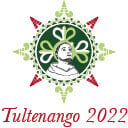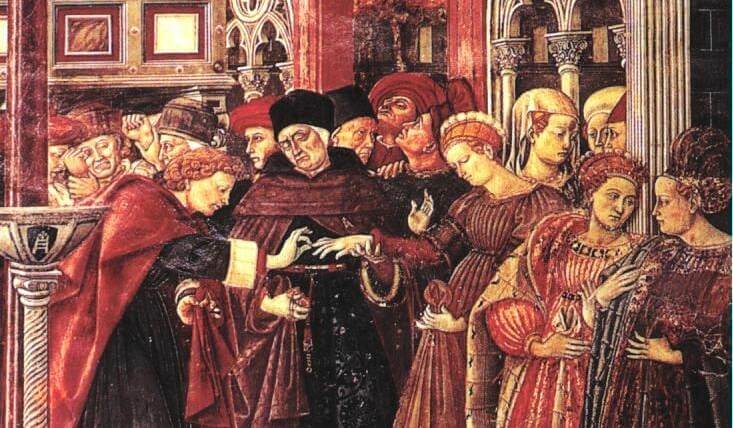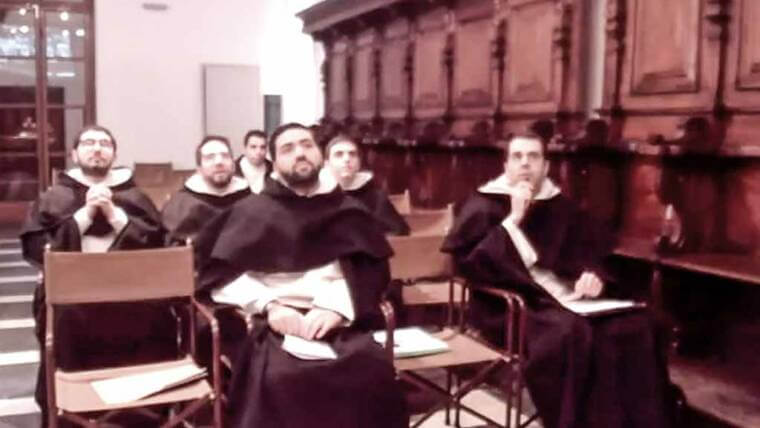Course for Novices and Sisters in temporary vows

The Historical Institute of the Order of Preachers, in collaboration with Dominican Sisters Europe, hosted a formation course on the ‘History, Tradition and Spirituality of the Dominican Order’ for novices and junior professed sisters from 10-15th November 2023 in Rome. The conference was a classic Dominican balance of study, prayer and community shared between twenty-three sisters drawn from eight countries and nine congregations.
The Dominican Sisters of Charity of the Presentation of the Blessed Virgin offered us warm hospitality in their residence in Rome. The gradual arrival of sisters on Friday afternoon brought a crescendo of youth and exuberance to the residence as we began to meet, greet and eat, Italian style!
The conference was officially launched with a talk from Fr Augustin Laffay, OP, the General Archivist of the Order of Preachers and a member of the Pontifical Committee for Historical Sciences, on the topic of our founding father ‘St Dominic’.
Fr Laffay brought to life St Dominic’s dynamic and vibrant personality, the radicality of his call to become a ‘different’ kind of religious and highlighted the universal need of the preaching mission. This was followed by a talk by Fr Paul Murray, OP, an Irish Dominican friar and renowned scholar and spiritual teacher, on our ‘Dominican Identity’. We were reminded that our identity is above all a call to joyful compassion towards all people, the very essence of the proclamation of the “Good News” of Jesus Christ.
We concluded the first evening by praying Vespers together. Our gathering of sisters embodied the linguistic and cultural diversity of Europe, and we honoured our difference by praying parts of the text in our own native languages, alternating singing and speaking. This prayer was a moving testimony to the Lord drawing all people to Himself (Jn 12:32) and establishing unity in diversity. This is surely another great strength of our Order in particular – that we are one – and a powerful witness in pluralistic Europe. The evening offered optional, informal recreation for all sisters – an open invitation every night of our course – and provided an opportunity for building the bonds of fellowship between us.
We reconvened on Saturday morning, the most intensive teaching day of the course. The morning began with a talk from Marta Pozzi, a doctoral student at the Università Cattolica del Sacro Cuore in Milan, on ‘Dominican Saints and Blessed’s in the History of Art: Iconographic Aspects’. Amidst the cultural richness of Rome, the meaning of religious art is often lost on us because of our ‘artistic illiteracy.’ This lecture was therefore a golden opportunity to learn how to ‘read’ artistic symbolism to sharpen our contemplative gaze before the treasures and truths hidden throughout European culture, and to ponder more deeply on the venerable sisters and brothers of our hagiographic tradition illustrated in the art.
This was followed by a talk from Sr Sabine Schratz, a member of the Historical Institute and sister of the Cabra Congregation in Ireland, on ‘The founding context of Congregations of Dominican Sisters in the 19th and 20th Century’. The uniqueness, magnanimity and tenacity of our Dominican sisters manifested itself as we heard about the different spiritual impulses that inspired, and different historical contexts which formed, the foundation of the many Dominican Congregations in Europe. There was a great energy in the room as many of the Congregations mentioned were represented by the sisters at the meeting, and the heroism of many of our ‘mothers in faith’ continues to live in us and through us as we face the future with hope. It was highlighted that while we are excellent “doers of the word” (Jas 1:22), we are often not ‘recorders’ of what we do! The importance of keeping archives – the history of how we have proclaimed the Good News and the way in which we pass on the good news of our Congregation from generation to generation– is something we need to pay more attention to in our communities.
After lunch, we heard two talks from Prof Alessandra Bartolomei Romagnoli, professor at the Faculty of History at the Pontifical Gregorian University and the Pontifical University of Saint Thomas Aquinas. The first talk was on ‘Sanctity and the Dominican female mystic’, and the second was on ‘Church and Prophecy in St Catherine of Siena’. These talks situated our Dominican women saints as women who married personal intimacy with Christ with passionate care for His Body, the Church. Surely our female mystics were ‘synodal servants’ long before our current synodal process began.
On Sunday, with great joy we celebrated Lord’s Resurrection with Mass at St Peter’s Basilica, followed by the papal Angelus and apostolic blessing in St Peter’s square. It was a privilege to participate in the Eucharist – the source and summit of our life – in the heart of the Church. Truly an occasion to ‘give thanks!’ The afternoon was given to a veritable feast and fellowship, before the sisters took off for some sightseeing across the city – or a Sabbath rest!
The course recommenced on Monday with Lauds, Mass and a tour of the Basilica of Santa Maria Sopra Minerva with Fr Christian Steiner, OP. This basilica has the special status of housing most of the body of St Catherine of Siena, the patron saint of many of our congregations. This was a moving encounter for many of our sisters. May our sister St Catherine grant us a double share of her spirit!
Afterwards, we made a visit to a great hub of Dominican intellectual life, the Pontifical University of St Thomas Aquinas, and we were warmly welcomed by Fr Dominik Jurczak, OP, Dean of the Faculty of Theology. Fr Dominik highlighted that the university welcomed Dominican sisters with open arms and looked forward to receiving more sisters in due time so that the full vitality of the Dominican family could be used.
The visit to the Angelicum paved the way for the first of our afternoon talks, this one by Fr Viliam Stefan Doci, OP on ‘Albert the Great and Thomas Aquinas’. The great intellectual tradition of the Order was explored, and it reminded us of the need to ‘make faith intelligible’ to an unbelieving, sceptical and religiously plural European population. God has given the Order a great gift and responsibility to cultivate ‘intelligent faith’ and we must not be slothful stewards of our talents. The second talk took a different direction through the contribution of Fr Orlando Rueda Acevedo, OP on the theme of ‘Preaching through Art’. This presented a contrasting yet complementarity medium of preaching. We are called to be “Logos”-centric (Christ-centred) but not necessarily “logocentric” (word and language centred). The visual and auditory arts have a valuable contribution to make to evangelisation. Ultimately whatever forms of communication we use, we are to be ever creative in our presentation of the Gospel! Both talks were encouragement to use whatever gifts God gives us for the sake of our mission, and to recognise that where we lack, our sisters may be rich. This is a gift too! Let us rejoice and give thanks for our diversity. Such is a glory of the Body of Christ working together in harmony.
On Tuesday, we received a talk from Sr Helen Alford, a member of the Dominican Sisters of St Catherine of Siena of Newcastle Natal, the Dean of Social Sciences at the Pontifical University of St Thomas Aquinas and the president of the Pontifical Academy of Social Sciences, on ‘The Justice and Peace Tradition in the Order’. The commitment to social justice is constitutive to our Order and integral to our mission of evangelisation. This is an area where our study has the potential for great practical value, as we can apply our mind to analysing structural injustices and challenging them, as well ‘putting our money where our mouth is’ and doing grassroots work on the ground.
The possibility of realising both of these dimensions was brought to life for us with a panel discussion with the Justice and Peace Promoter of the Order, Fr Aniedi Okure, OP, and Sr Margaret Mayce, OP who shared their experience of working at the UN in New York and Geneva. Sr Philomena Benedict Le Gall OP, DSE Justice and Peace Promoter, gave us an update on the current involvement of the Order in international justice and offered information, encouragement and support to nurture our own grassroots work for the social Gospel.
An understanding of the international network of the Order continued in the afternoon as we visited Fr. Gerard Timoner III, OP, Master of the Order of Preachers at the Basilica of Santa Sabina. We were very grateful to the Master for his generosity in meeting us and making us welcome as members of the Dominican family. This ‘family feeling’ was enhanced by a short talk from Br. Cristobal Torres Iglesias, OP, the new General Promoter for the Laity, who presented an overview of the lay fraternities and fraternal groups across the world. The future looks bright for our family!
Finally, we heard from Sr Margaret Mayce, OP, the international coordinator for Dominican Sisters International Commission (DSIC), and Sr Pilar del Barrio, OP, the European coordinator of Dominican Sisters International (DSE). This time was an opportunity for Srs. Margaret and Pilar to introduce us to DSIC and DSE, of which our collaboration as young sisters is vital and valued.
The week we spent together gave us a wonderful example of the benefits and opportunities afforded by these networks. The course officially closed with Mass at Santa Sabina and a meal, sharing table fellowship in word, sacrament and presence, before departing the next morning.
Truly, it was a time “full of grace and truth”! (Jn 1:14).
Sr Rose Rolling, OP







